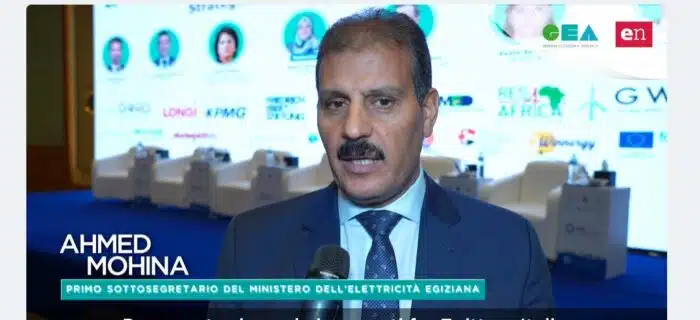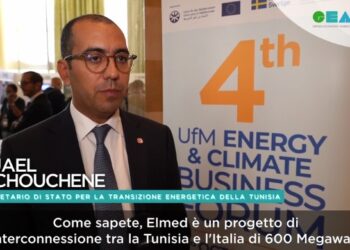Cairo – Egypt and Italy are getting closer: preliminary studies for an ambitious 3 GW electricity interconnection project are expected to be completed by the end of the year. Egyptian Ministry of Electricity sources confirmed that this study, carried out by a Norwegian consulting firm appointed by the Italian side, includes a detailed analysis of the proposed route, identification of starting points in both Egypt and Italy, and an assessment of the depth profile of the Mediterranean Sea. Once completed, this study will be submitted for review by the Egyptian side, marking a significant step toward realizing a project that can potentially transform the Mediterranean energy landscape.
Ahmed Mohina, the first undersecretary of the Egyptian Ministry of Electricity, reiterated today the willingness to create a nearly 3,000-km electricity pipeline during Cairo Sustainable Energy Week (CSEW), speaking of the strong and growing relationship between Italy and Egypt and stressing the importance of cooperation in the fields of power generation and transmission. “We are working closely with our Italian colleagues to discuss an interconnection project designed to export green energy to Italy. Our initial goal is to reach 6,000 MW within 4-6 years, with the ambition to further expand this capacity to 8,000 MW to meet the energy demand of the whole of Europe.”
Mohina also highlighted Egypt’s strategic geographic location between Africa and Europe, making it an ideal corridor for energy exports. “We are ready to discuss with Italy and Greece not only for energy exports but also to attract projects and investments in key sectors such as electrolyzers, photovoltaics, and wind power. We wish to explore several opportunities, and we are working to engage businesses and companies to invest in Cairo and throughout Egypt,” he added, highlighting the growth potential of Egypt’s energy sector.
Regarding financing the project, the sources clarified that Egypt will not bear the start-up costs of the interconnection. Italy will cover these costs – which Mohina did not want to quantify – while the Egyptian electricity transmission company will benefit from the electricity transmission tariffs provided for the project. This financing model could benefit both parties while ensuring the economic viability of the goal of connecting, after a 2800-km route, the West Sohag region of Egypt with the Dolo substation in the Venice metropolitan area. According to other sources, this interconnection could pave the way for further developments and connections with other parts of the Middle East, such as the Gulf, creating a more integrated and resilient energy network.
English version by the Translation Service of Withub









